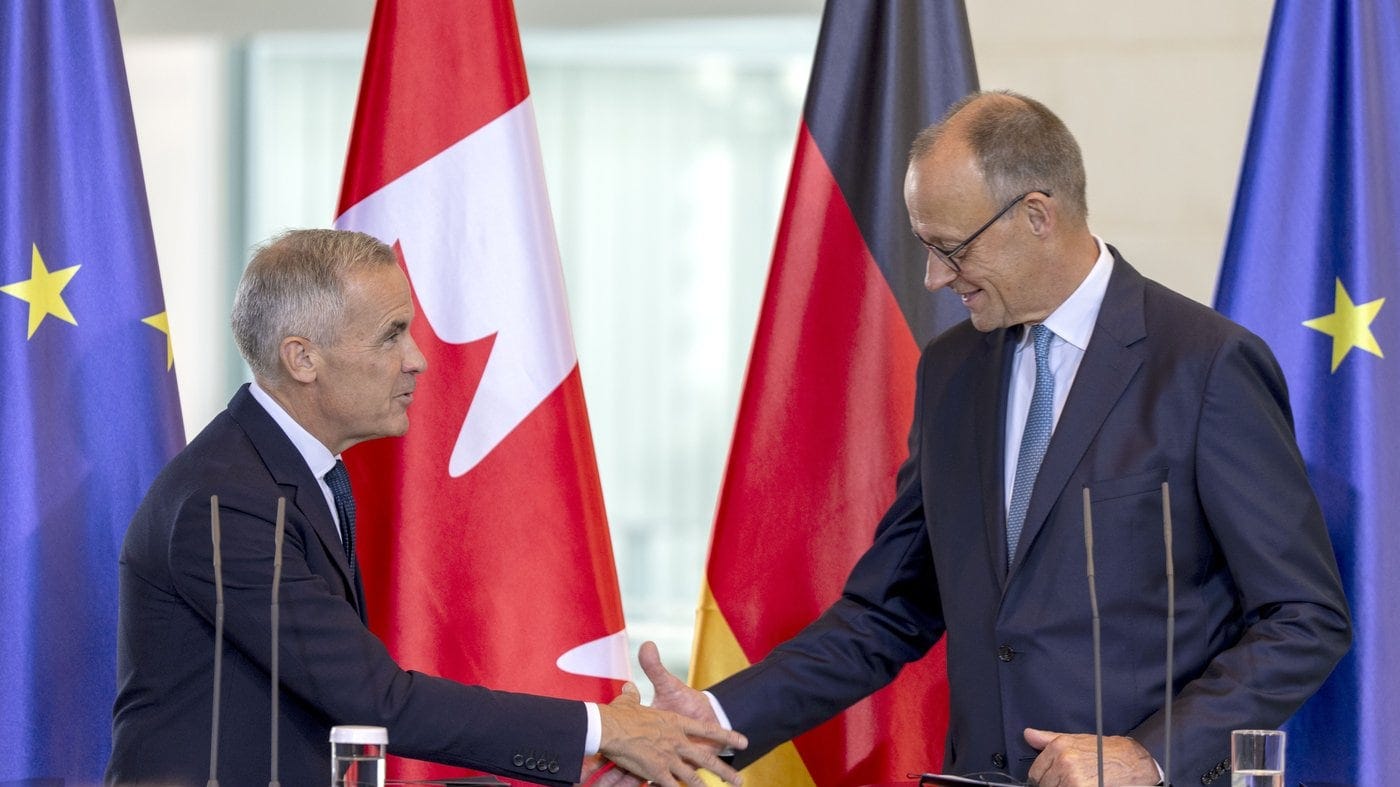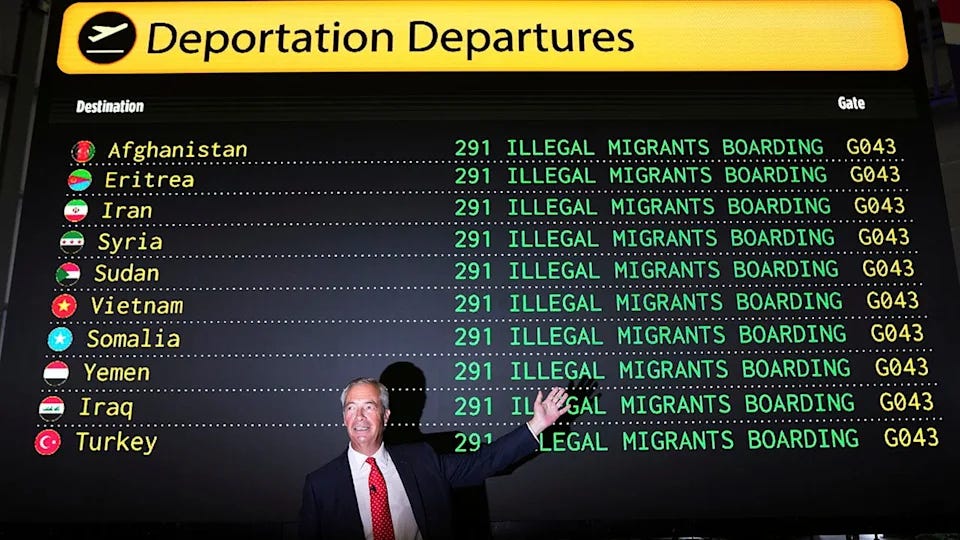Good morning, it’s Wednesday, August 27th. In today’s news, Carney and the Liberals blow past immigration “caps” in just six months, Canada eyes 12 new submarines and critical mineral deal with Germany, CBC spends taxpayer dollars to conceal streaming data, US government now considering equity stakes in defence contractors, and much more.
First time reading the daily blend? Sign up here.
Immigration Nation: Canada Blows Past Liberal “Caps” in Just Six Months
The Trudeau–Carney Liberals told Canadians they’d “cap immigration” and restore balance to the system. The numbers prove the opposite—Canada’s immigration intake is completely out of control.
According to the latest Immigration, Refugees and Citizenship Canada (IRCC) data, the government has already blown past multiple 2025 immigration targets in just the first half of the year:
Temporary foreign workers: Target was 82,000. The Liberals have already issued 105,195 permits.
International Mobility Program (IMP): Cap was 285,750. The Liberals already admitted 302,280, with half the year still to go.
Permanent residents: Target is 395,000. Canada admitted 207,650 in the first six months, putting the country on track for 415,300, one of the highest levels in history.
This is on top of ballooning asylum claim backlogs—291,000 in 2025—and unknown numbers of illegal immigrants—up to 500,000 according to government data.
Carney and the Liberals promised to bring immigration down to “sustainable levels” and cap temporary workers and students to less than 5% of the population by 2027. Instead, the system is running wide open, crushing housing supply, overwhelming hospitals, and flooding the job market.
Even worse, the government tried to bury the numbers. After being blasted for hiding datasets, the IRCC admitted it was “changing how data is shared” to make it more “accessible”—a transparent attempt to spin and delay the release of damaging statistics.
Pierre Poilievre and Michelle Rempel Garner called it exactly what it is: a disaster created by an “open-borders policy” that broke Canada’s immigration system.
The facts are simple: Carney lied. The Liberals are shattering their own caps, hiding the data, and Canadians are the ones paying the price—in higher rents, longer ER wait times, and fewer jobs for citizens. Source
Canada Eyes 12 New Submarines and Critical Mineral Deal with Germany
Prime Minister Mark Carney’s trip to Germany this week highlights two of Ottawa’s top strategic priorities: modernizing Canada’s outdated submarine fleet and carving out a role in the global critical minerals race.
On the military front, Canada has narrowed its submarine procurement to two foreign suppliers — Germany’s ThyssenKrupp Marine Systems and South Korea’s Hanwha Ocean. The plan is ambitious: replace the Royal Canadian Navy’s four aging Victoria-class submarines with as many as twelve new boats by 2035. That would mark the most significant naval investment in Canadian history.
Carney stressed that Canada’s unique geography demands highly specialized submarines capable of long deployments under Arctic ice as well as in the Pacific. “We need to be able to have year-round fleets on all three coasts under quite demanding conditions,” he said in Berlin. Ottawa is also looking for significant economic offsets, including domestic maintenance contracts, to justify the enormous price tag.
The submarine project comes as Carney accelerates defence spending to meet NATO’s 2% GDP target — a long-standing point of friction between Canada and its allies. While the promise of twelve new submarines signals a serious shift, delivery is not expected until the mid-2030s, leaving questions about near-term capability gaps.
Beyond submarines, Carney and German Chancellor Friedrich Merz unveiled a new critical minerals partnership. The agreement, while not legally binding, commits the two countries to jointly promote projects that reduce reliance on China and Russia for vital resources such as nickel and cobalt. Carney noted that demand for these minerals could quadruple in the next decade, positioning Canada as a key supplier for Europe’s diversification efforts.
The deal also ties into broader cooperation on liquefied natural gas (LNG) and hydrogen energy. Canada plans to announce new investments in port infrastructure within two weeks, including upgrades in Montreal and Churchill, Manitoba, aimed at boosting mineral and energy exports.
Both governments appointed senior envoys to drive the partnership forward — a sign that Ottawa sees critical minerals not just as an economic play, but as part of its security posture. As Carney put it, “Canada can play a role in accelerating that diversification for Germany, and for Europe.”
With submarines beneath the ice and minerals beneath the soil, Canada is attempting to position itself as a more serious NATO partner. But execution — and timelines — will determine whether this is strategy or just talk. Source.
CBC Spends Taxpayer Dollars to Conceal Streaming Data
CBC/Radio-Canada is headed to Federal Court to avoid disclosing how many Canadians actually pay for its streaming service, Gem. The broadcaster is challenging an order from the federal information commissioner, who ruled that the number of paid subscribers must be made public.
This legal fight stems from a simple access-to-information request filed by University of Ottawa professor Matt Malone. CBC refused to provide the data, claiming it fell under exemptions related to programming activities and competitive harm. The information commissioner disagreed and ordered disclosure. Rather than comply, the publicly funded broadcaster is spending more of its resources on lawyers.
Malone calls the move “a sad but telling attempt to dodge basic transparency.” His point is clear: CBC reporters routinely use access-to-information requests to hold other institutions accountable. If the broadcaster itself resists those same standards, it sets a dangerous precedent. It undermines the very tool that journalists use to pry open government secrecy.
The irony is thick. CBC is not a private corporation protecting proprietary market strategies; it is a taxpayer-funded institution. Canadians spend over a billion dollars a year to keep it afloat. Asking how many people are willing to pay $5.99 a month for Gem’s premium tier is hardly a trade secret. It is a basic question of whether the public is getting value for money.
Industry watchers note that CBC’s reluctance isn’t unique—many streaming services do not disclose their subscriber figures. But the comparison only goes so far. Netflix or Crave are private companies. CBC is not. Its credibility depends on transparency and accountability.
There’s also a cultural question: CBC justifies its subsidies by positioning itself as essential to Canadian democracy. Yet what does it say when the same organization resists disclosing numbers that would help Canadians evaluate its relevance in a crowded streaming market?
Market analysts suggest Gem has “respectable numbers” compared to competitors, but that much of its user base is likely free-tier subscribers. If that’s the case, why hide it?
Transparency should not be optional for a public broadcaster. If CBC wants to maintain its legitimacy, it must stop acting like a private company and start acting like what it is—an institution funded by Canadians, for Canadians. Source.
Following Intel Stake, US Government Now Weighing Equity Stakes in Defence Contractors
The Trump administration is exploring a new, controversial approach to government involvement in private industry, following its recent $9.5 billion, 10 percent stake acquisition in Intel. Commerce Secretary Howard Lutnick confirmed on CNBC that the Department of Defense is weighing similar moves with major defense contractors like Lockheed Martin, Northrop Grumman, Boeing, General Dynamics, and RTX.
Lutnick described Lockheed as “basically an arm of the U.S. government” due to its heavy reliance on federal contracts and hinted at a broader overhaul of DOD appropriations and ownership stakes in defence companies. Trump himself has signalled his intention to pursue more deals like the Intel acquisition, framing it as a way to “take care of the American taxpayer.”
Critics warn the approach risks blurring the lines between private enterprise and government control, with Republican senators comparing it to state-owned enterprises reminiscent of the USSR or raising fears of creeping socialism. Intel has also flagged potential fallout, warning that having the US government as a major shareholder could provoke investor backlash, employee concerns, litigation, and even hurt overseas sales, since 76 percent of its revenue comes from international markets.
While proponents see this as a way to secure critical industries and defend national interests, experts caution it represents a dangerous path toward government entanglement in private business, echoing models used in China, where political and commercial interests are deeply intertwined. More
Reform UK Party Pushes ‘Operation Restoring Justice’—A Plan to Deport 600,000 Asylum Seekers
Reform UK leader Nigel Farage unveiled “Operation Restoring Justice,” a plan to deport 600,000 asylum seekers and withdraw Britain from the European Convention on Human Rights. Farage said the measures are needed to stop migrant boat crossings and prevent “civil disorder,” while critics blasted the proposal as unrealistic and a threat to human rights. Immigration has now overtaken the economy as voters’ top concern, with Reform UK surging in polls despite holding just four seats in Parliament. More
Coffee You Can Drink ‘All Day’
Two of our good friends just launched a new coffee brand—And they’re hands-down the biggest coffee nerds I know, so this stuff slaps.
It’s called All Day Coffee ☕️ and it’s the only brand that offers
full-caff - 100%
half-caff - 50%
quarter-caff - 25%
and decaf - 0%
…so you can pound that stuff all day.
And right now you can get 20% off and free shipping by using the code WELCOME20 so…this would be the time to give it a try!
Here’s the link - alldaycoffee.co
Canada Not Expected to Meet Housing Target in the Next Decade, Parliamentary Budget Officer Says - Projections show Canada will be short by more than 700,000 homes, a gap equal to three years of construction. More
25 Countries Suspend Postal Services to US Over Tariffs - The move has sparked a flurry of announcements from postal services, including in France, Britain, Germany, Italy, India, Australia and Japan, that most US-bound packages would no longer be accepted. More
RFK Jr. Says HHS Will Disclose Causes of Autism in September - More
French Stocks and Bonds Tumble as Government Faces Potential Collapse After the Prime Minister’s Confidence Vote on the Budget Plan Backfires - More
Trump Threatens Tariffs for Nations With Digital Taxes on US Tech - The president argues that other countries’ digital taxes and regulations were ‘all designed to harm, or discriminate against, American technology.’ More
Record Drug Haul Seized by US Coast Guard Was Enough to ‘Fatally Overdose the Entire Population’ of Florida - The cutter Hamilton offloaded about 61,740 pounds of cocaine and 14,400 pounds of marijuana at Port Everglades in Fort Lauderdale. The total value of the seized drugs was put at US$473 million. More
Shopify Revives ‘Hate Speech’ Ban, Opening Door to Subjective Censorship
Shopify, Canada’s largest tech company, has quietly reversed course on free expression by tightening rules against “hateful content” on its Shop platform. The company’s updated policy now bans products that promote “hateful content, violence, gore, profanity, or offensive content.” This comes just a year after Shopify scrapped a similar ban from its acceptable use policy—suggesting the firm is moving back toward policing speech on its platform.
The problem is the subjectivity. Terms like “hateful” or “offensive” are vague, leaving it to Shopify—and, by extension, government, activists, or public pressure campaigns—to decide what qualifies. Holocaust denial merchandise and Nazi imagery clearly cross a line, but the same rules could be stretched to ban politically unpopular speech, satire, or even products tied to hot-button cultural issues.
This is the essence of the slippery slope: once a company assumes the power to censor what’s “offensive,” there’s no clear boundary between banning swastikas and banning ideas someone simply dislikes. With Shopify valued at over C$252 billion, its policies don’t just set standards for its own site—they shape the entire online economy. More
Servicing Canada's Ballooning Debt Now Costs $2,000 per Citizen, per Year - More
Nvidia Unveils $3,499 Robotics Chip for 'Physical AI' - Nvidia positions the chip for diverse industries, including manufacturing and healthcare, with early adopters Agility Robotics, Amazon Robotics, Meta, and Boston Dynamics. More
Kick Faces Possible $49 Million Fine after French Streamer Jean Pormanove Dies on Air - More
Why Can't We Walk Through Walls if Atoms Are Mostly Empty Space?
In movies and fiction, walking through walls seems effortless, but physics makes it essentially impossible in reality. Atoms, though mostly empty space, are kept apart by two key principles: electromagnetic repulsion and the Pauli exclusion principle. Electrons form “probability clouds” around atomic nuclei, creating negative charges that repel other electrons, while the Pauli exclusion principle prevents electrons (fermions) from occupying the same state or space. Together, these forces make solid matter feel solid and prevent objects, including humans, from passing through one another.
Quantum mechanics introduces a technical loophole: quantum tunneling, where particles occasionally appear on the other side of barriers. However, the probability of an entire person phasing through a wall is astronomically small—1 in 10^(10^30)—effectively zero for any practical purpose. Even with quantum quirks, walking through walls remains a science-fiction dream. More
‘We’ve Never Seen Anything Like It’: 300,000-Year-Old Chinese Dental Fossils Reveal an Unknown Hybrid Ancestor - More
Netflix Brings Hits to Life with Immersive Netflix House Experiences
Netflix is taking its biggest shows and films off the screen and into the real world with the launch of Netflix House, massive new immersive venues set to open this fall. The first will debut on November 12 in Philadelphia, followed by a second opening on December 11 in Dallas.
Each Netflix House will span more than 100,000 square feet, offering fans the chance to step inside the worlds of hit series like Wednesday, Squid Game, and Stranger Things, along with blockbuster films such as Knives Out. Visitors can expect interactive, story-driven experiences, including the infamous “Red Light, Green Light” challenge from Squid Game, as well as a rescue mission in Hawkins to battle the Demogorgon.
The venues will also feature themed dining through a full-service restaurant called Netflix Bites, photo opportunities, and merchandise shops. The Philadelphia location will include a movie theater, virtual reality games, and even a mini-golf course inspired by Bridgerton, Is It Cake?, and WWE, while the Dallas site will boast Netflix RePLAY, a game room packed with physical challenges, retro-style games, and immersive story rooms.
Netflix is also planning to expand further, with a third Netflix House already slated for Las Vegas in 2027, part of a new retail and entertainment complex on the Strip. More
NFL Roster Cuts: Full List of Released and Waived Players Now that Deadline Has Passed - More
Pop Star Taylor Swift and Kansas City Chiefs Tight End Travis Kelce Announce Engagement - More
Devon Walker Announces ‘SNL’ Exit After 3 Seasons, Calls It ‘Toxic as Hell’ - More
After Significant Pushback for a ‘Woke’ Rebrand, Trump Calls on Cracker Barrel to Abandon They’re New Logo…And so They Did
A British Airways Flight Attendant Was Found Naked and High on Meth in the Bathroom of an Airplane Headed to Heathrow
On This Day in 1896, the world witnessed what is still recorded as the shortest war in history. The conflict between Britain and the Sultanate of Zanzibar lasted a mere 38 minutes, beginning at 9:02 am and ending at 9:40 am.



















